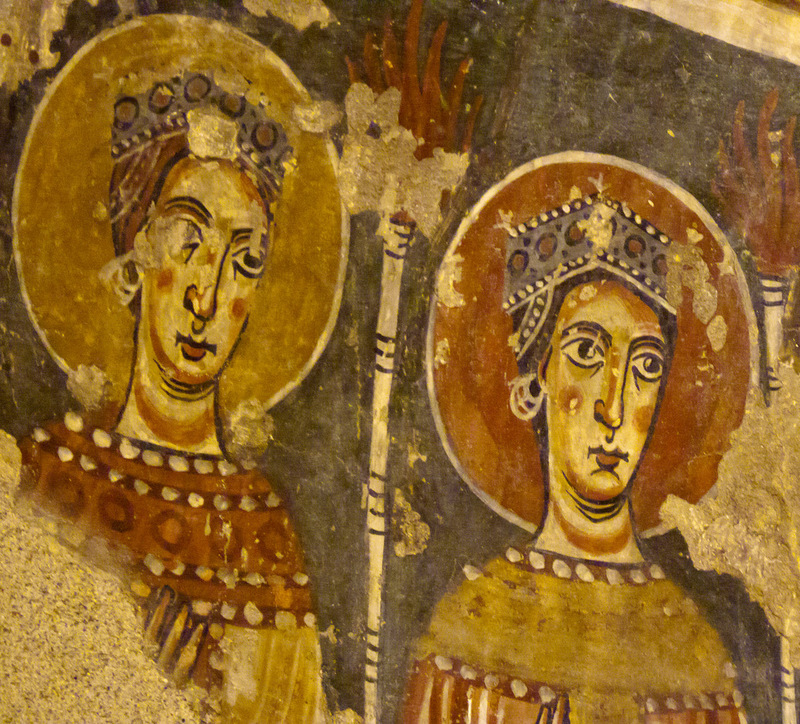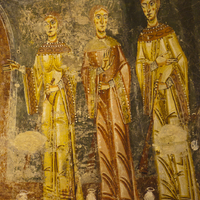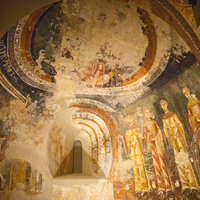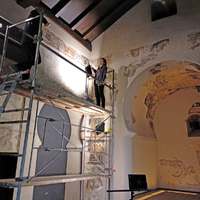Sant Quirze de Pedret frescoes
Type:
Churches,
Wall paintings
Date:
ca. 1100
Location or Findspot (Modern-Day Country):
Spain
Description:
The medieval churches in the Pyrenean foothills of modern-day Catalonia are especially well known for extensive, colorful wall paintings dating to the late eleventh and twelfth centuries. Many of these were removed from their original locations in 1919–23, transferred to canvas, and installed in Barcelona's Museu Nacional d'Art de Catalunya.
The frescoes reproduced here are from the church of Sant Quirze de Pedret. The church itself probably dates to the ninth century, with different layers of wall painting corresponding to different decorative phases. The paintings executed around 1100, like many others of the region, show signs of influence from contemporary wall painting in northern Italy, including elements of Byzantine iconography and style. Apocalyptic themes are prominent in Sant Quirze de Pedret. The central wall of the main apse (now in the Museu Diocesà i Comarcal in Solsona) shows the Elders of the Apocalypse around the Book of the Seven Seals, which is placed on a prepared throne. The Four Horseman of the Apocalypse, Christ in Majesty, and John writing his vision all appear in other parts of the main apse. The southern apse (now in the Museu Nacional d'Art de Catalunya) depicts the parable of the Wise and Foolish Virgins (Matt. 25:1-13). The wise virgins, depicted with crowns, are those who have kept their torches lit and are prepared for the bridegroom's (i.e., Christ's) return. Unlike the foolish virgins, with their disarrayed gestures and gazes, the wise virgins appear orderly and keep their eyes on Christ. This story was meant to encourage preparedness for the end of time.
The frescoes reproduced here are from the church of Sant Quirze de Pedret. The church itself probably dates to the ninth century, with different layers of wall painting corresponding to different decorative phases. The paintings executed around 1100, like many others of the region, show signs of influence from contemporary wall painting in northern Italy, including elements of Byzantine iconography and style. Apocalyptic themes are prominent in Sant Quirze de Pedret. The central wall of the main apse (now in the Museu Diocesà i Comarcal in Solsona) shows the Elders of the Apocalypse around the Book of the Seven Seals, which is placed on a prepared throne. The Four Horseman of the Apocalypse, Christ in Majesty, and John writing his vision all appear in other parts of the main apse. The southern apse (now in the Museu Nacional d'Art de Catalunya) depicts the parable of the Wise and Foolish Virgins (Matt. 25:1-13). The wise virgins, depicted with crowns, are those who have kept their torches lit and are prepared for the bridegroom's (i.e., Christ's) return. Unlike the foolish virgins, with their disarrayed gestures and gazes, the wise virgins appear orderly and keep their eyes on Christ. This story was meant to encourage preparedness for the end of time.
Relevant Textbook Chapter(s):
7
Repository and Online Resources:
• Two of the Pedret side apses, as well as other contemporary programs associated with the Circle of the Master of Pedret (Sant Pere d'Àger, Santa
Maria d'Àneu, Sant Pere del Burgal) are on view at the Museu Nacional d'Art de Catalunya, Barcelona.
• Pedret's central apse is on display at the Museu Diocesà i Comarcal, Solsona.
• Watch a video on the paintings from Pedret and their iconography.
• Watch a video on how mural paintings were detached and transferred to canvas.
Image Credits:
Wikimedia Commons




